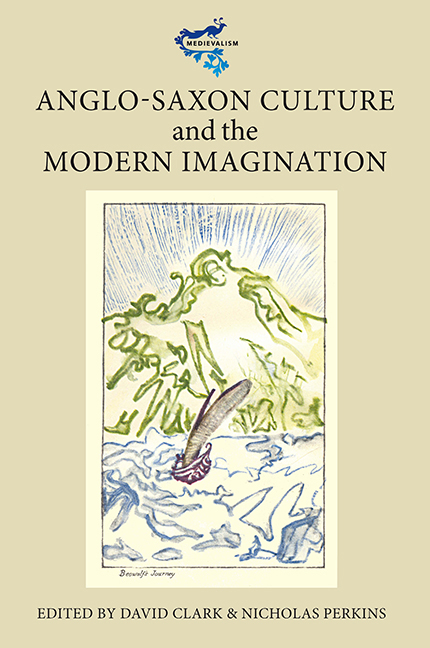Book contents
- Frontmatter
- Contents
- List of Illustrations
- Contributors
- Foreword
- Acknowledgements
- Abbreviations
- Introduction
- 1 From Heorot to Hollywood: Beowulf in its Third Millennium
- 2 Priming the Poets: The Making of Henry Sweet's Anglo-Saxon Reader
- 3 Owed to Both Sides: W.H. Auden's double debt to the literature of the North
- 4 Writing for an Anglo-Saxon Audience in the Twentieth Century: J.R.R. Tolkien's Old English Chronicles
- 5 ‘Wounded men and wounded trees’: David Jones and the Anglo-Saxon Culture Tangle
- 6 Basil Bunting, Briggflatts, Lindisfarne, and Anglo-Saxon Interlace
- 7 BOOO Seeing Beowulf in Pictures and Print
- 8 Window in the Wall: Looking for Grand Opera in John Gardner's Grendel
- 9 Re-placing Masculinity: The DC Comics Beowulf Series and its Context, 1975–6
- 10 P.D. James Reads Beowulf
- 11 Ban Welondes: Wayland Smith in Popular Culture
- 12 ‘Overlord of the M5’: The Superlative Structure of Sovereignty in Geoffrey Hill's Mercian Hymns
- 13 The Absent Anglo-Saxon Past in Ted Hughes's Elmet
- 14 Resurrecting Saxon Things: Peter Reading, ‘species decline’, and Old English Poetry
- Index
Introduction
Published online by Cambridge University Press: 20 April 2017
- Frontmatter
- Contents
- List of Illustrations
- Contributors
- Foreword
- Acknowledgements
- Abbreviations
- Introduction
- 1 From Heorot to Hollywood: Beowulf in its Third Millennium
- 2 Priming the Poets: The Making of Henry Sweet's Anglo-Saxon Reader
- 3 Owed to Both Sides: W.H. Auden's double debt to the literature of the North
- 4 Writing for an Anglo-Saxon Audience in the Twentieth Century: J.R.R. Tolkien's Old English Chronicles
- 5 ‘Wounded men and wounded trees’: David Jones and the Anglo-Saxon Culture Tangle
- 6 Basil Bunting, Briggflatts, Lindisfarne, and Anglo-Saxon Interlace
- 7 BOOO Seeing Beowulf in Pictures and Print
- 8 Window in the Wall: Looking for Grand Opera in John Gardner's Grendel
- 9 Re-placing Masculinity: The DC Comics Beowulf Series and its Context, 1975–6
- 10 P.D. James Reads Beowulf
- 11 Ban Welondes: Wayland Smith in Popular Culture
- 12 ‘Overlord of the M5’: The Superlative Structure of Sovereignty in Geoffrey Hill's Mercian Hymns
- 13 The Absent Anglo-Saxon Past in Ted Hughes's Elmet
- 14 Resurrecting Saxon Things: Peter Reading, ‘species decline’, and Old English Poetry
- Index
Summary
Come back past
philology and kennings,
re-enter memory
where the bone's lair
is a love-nest
in the grass.
In Seamus Heaney's poem ‘Bone Dreams’, the speaker/dreamer discovers layers of northern and personal history by delving through the linguistic past. A ‘White bone found / on the grazing’ is recognized as a verbal artefact at once through the ‘rough, porous / language of touch’ (p. 27). Its imaginative scope soon expands to ‘Bone-house’, later italicized as the Old English kenning ‘ban-hus’: a found object, like the bone itself, part of the ‘coffered / riches’ of grammatical knowledge granted to those surrounding the fire-warmed benches of the heroic, intimate thinking space that the compound represents (pp. 27, 28). This treasure-trove of linguistic memory is not reached easily. The speaker's earlier reaction is to ‘wind’ the bone ‘in the sling of mind / to pitch it at England’ (p. 27), an action reminiscent both of David versus Goliath, and of the street violence of 1970s Northern Ireland, signalling the place of (the) English as invader and colonizer. ‘Bone Dreams’, however, is far from simply oppositional, at times channelling an unpredictably erotic force through its responses to language, body, and landscape: here the bone's fall in the fields of England seems already to have generative potential, echoing classical myths of Cadmus and Jason, both of whom sowed teeth that sprang up as warriors. The speaker then ‘push[es] back / through dictions’, plotting linguistic history in reverse and working past accreted layers of Elizabethan, French and Latin to arrive at ‘the scop's / twang, the iron / flash of consonants / cleaving the line’ (p. 28). The Anglo-Saxon scop (poet, maker) is also a linguistic warrior, whose blade/tongue both breaks up (cleaves) the poetic line, and paradoxically structures or holds it together (cleaves in its other sense). Heaney's own short lines and their rhythmic music echo the half lines of Old English verse, while the variety of sound effects in kenning-rich phrases such as ‘love-den, blood-holt, / dream-bower’ (p. 29) compound the technical and thematic energies of the poem.
- Type
- Chapter
- Information
- Anglo-Saxon Culture and the Modern Imagination , pp. 1 - 12Publisher: Boydell & BrewerPrint publication year: 2010



